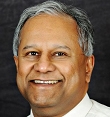Arif Virani’s résumé is long and impressive. And nobody would say the newly appointed Parliamentary Secretary to the Minister of Immigration, Refugees and Citizenship is just not ready for the job.
Considered a star in Justin Trudeau’s firmament, the Parkdale–High Park MP’s name had figured in several speculative cabinet lists trotted out by the media.
One even named him as a possible Minister for Justice and Attorney General based on his legal career, which includes prosecuting genocide cases at the United Nations International Criminal Tribune for Rwanda and work on the Canadian Human Rights Commission.
But given the wealth of talent Trudeau could pick from to form his cabinet, it was inevitable that many eligible Liberal MPs would be left out. Virani was one of them.
“It is important that we get the refugee and immigration file right.”
“I am happy, honoured and privileged to be appointed as parliament secretary in a field I would 100 per cent want to be involved in given my background,” says Virani in a phone interview with New Canadian Media. “It is important that we get the refugee and immigration file right.”
Paying it forward
The background he is referring to was not just his work and education. It includes the lived experience of his family that began at a Montreal YMCA in 1972 on a cold October day.
Virani, who was only 10 months old then, and sister Shakufe, older by three years, came with their parents Sul and Lou as refugees ordered to leave Uganda with little notice by dictator Idi Amin.
Because of the friendship between the Aga Khan and then Prime Minister Pierre Trudeau, the Liberal government of the day accepted 7,000 of his Ismaili Muslim followers into Canada. It marked the first such refugee arrival from a non-European country.
“My parents recall their dangerous 40-odd kilometre drive to the airport from Kampala city. They were allowed to board the plane with only two suitcases and were told the rest of their baggage would follow them later,” Virani shares. “But they never showed up.”
“At a time when they were full of trepidation, Canada stepped up to the plate.”
However, Canadian immigration officials showed up on-board the aircraft en route to process their papers and generally help them.
“By the time they landed, my mother already had two job offers and was persuaded to opt for Montreal over Edmonton as the Quebec city was more cosmopolitan then and hence a better place for newcomers.
“All this meant a lot to my parents,” Virani adds. “At a time when they were full of trepidation, Canada stepped up to the plate.”
It is this display of generosity shown to his family and himself that he seems keen to pay forward.
Creating change from within
So what prompted him to get into politics despite all the cynicism that surrounds it?
“Justin Trudeau on the positive side and Stephen Harper on the negative side,” states Virani. “I felt disenfranchised for the past nine years. And early on I had realized that it was easier to bring change from within the government than from outside.”
“I felt disenfranchised for the past nine years.”
That realization came to him after the loops he went through to secure permanent annual funding for the South Asian Legal Clinic of Ontario that he co-founded and on whose board he served as a director for nearly eight years.
On some of the negativity generated by the current operation to bring in Syrian refugees, Virani feels the positive comments make up for it.
“The overall response of Canadians has been much more comforting. But that doesn’t mean we would ignore legitimate criticism.”
He dismisses the notion that Canada need not do anything for the refugees, as it had no role in creating the crisis.
“We are signatory to various human rights conventions and we have a duty as a global citizen.”
Virani also takes comfort from the way the world is again looking up to Canada when it comes to humanitarian relief.
He says the Office of the United Nations High Commissioner for Refugees (UNHCR), the UN refugee agency, is seeking Canada’s advice on refugee integration. The agency has said that the Canadian programs are a practical expression of support and wants other countries to do similarly.
Germany, the current leader in accepting Syrian refugees, is constantly looking to learn from Canada on refugee integration, says Virani, despite Chancellor Angela Merkel’s rather dim view about multiculturalism.
And amid the constant anti-immigrant rhetoric south of the border, Canada has been steadfast in going the “whole nine yards” in presenting opportunities for newcomers to succeed, he explains.
“We may not be perfect, but we get it right most times.”
A lot like his mother mistakenly referring to cranberry sauce as “red jam” at her first turkey dinner.
Ranjit is a Toronto-based writer with interest in Canadian civic affairs, immigration, the environment and motoring. Maytree and Al Jazzera English alumnus.





